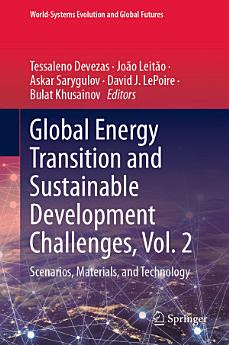Global Energy Transition and Sustainable Development Challenges, Vol. 2: Scenarios, Materials, and Technology
About this ebook
Global warming and climate change influenced the change in people’s consciousness and their awareness of the need for more limited use of hydrocarbon resources. Changes in weather conditions, rising sea levels, and destructive climate events such as hurricanes, forest fires, droughts, floods, etc. have become more frequent. Many countries around the world, reacting to these changes, have developed long-term plans to actively replace fossil fuels - gas, oil, and coal with renewable energy sources, mainly solar and wind. However, the low replacement rates observed in the global energy sector over the past 30 years raise the question of how far the decarbonization scenarios and models being implemented by many countries bring us closer to the ultimate goal of creating an economy with a low carbon footprint.
Seeking answers, the volumes feature 22 chapters split across the two books, which in detail discuss various aspects of the energy transition and their impact on the sustainability of economic development and the future of energy. This second volume, "Scenarios, Materials, and Technology," explores mechanisms and technological drivers for a sustainable transition in 12 chapters, from local industries to national economies.
About the author
Tessaleno Devezas is a Full Professor at the Atlântica – Instituto Universitário, Lisbon, Portugal, where he serves as the Director of Aeronautical Engineering and teaches and researches in the field of materials engineering, aeronautical engineering, energy systems, innovation and technology management, and technological forecasting. He is the author or co-author of various scientific papers published in peer-reviewed international scientific journals and the author or co-editor of 15 books.
João Leitão is an Associate Professor with habilitation and the Director of the UBIExecutive, Business School at the University of Beira Interior (UBI), Portugal. He further is vice-coordinator and a full researcher at the NECE Research Center in Business Sciences at UBI. He also is the President of the Associação Portuguesa para o Desenvolvimento Regional (APDR), the Portuguese Section of the European Regional Science Association (ERSA), as well as a member of the ERSAC board, ERSA and the European Council for Small Business and Entrepreneurship (ECSB). He is a prolific author and a series editor of the Springer book series Studies in Entrepreneurship, Structural Change, and Industrial Dynamics. Leitão is also an editorial board member of several international journals.
Askar Sarygulov is a Lead Researcher at the “Center for Interdisciplinary Research and Education on Technological and Economic Problems of Energy Transition (CIRETEC-GT)" at the Peter the Great St. Petersburg Polytechnic University, Russia. His research interests include nonlinear models of economic dynamics, structural dynamics of macroeconomic systems, green economy models, social processes, and economic inequality. He is the author or co-author of more than 60 scientific papers published in several international academic journals and the author or co-editor of 5 books.
David J. LePoire is aSystems Scientist at the Environmental Science Division, Argonne National Laboratory, Illinois, USA, and a board member of the International Big History Association. LePoire holds a PhD in computer science from DePaul University, Chicago, USA. He analyzes and applies new technologies for environmental, energy, and homeland security issues resulting in reports, software, and collaborative websites. LePoire develops environmental software, such as RESRAD, including aspects of analyses, training, models, and information systems.
Bulat Khusainov is a professor at the Non-Profit JSC (Zhetysu University named after I. Zhansugurov), Taldykorgan city, Kazakhstan. His research interests include macroeconomics (quality and inclusiveness of growth), world economy and international relations, problems of globalization and Slowbalization (global challenges, global and cross-country inequality), transnationalization, international capital migration and world trade, the integration of national economy, and the new energy paradigm. He is the author or co-author of more than 200 scientific papers published in several international academic journals and the author or co-editor of 12 books.




